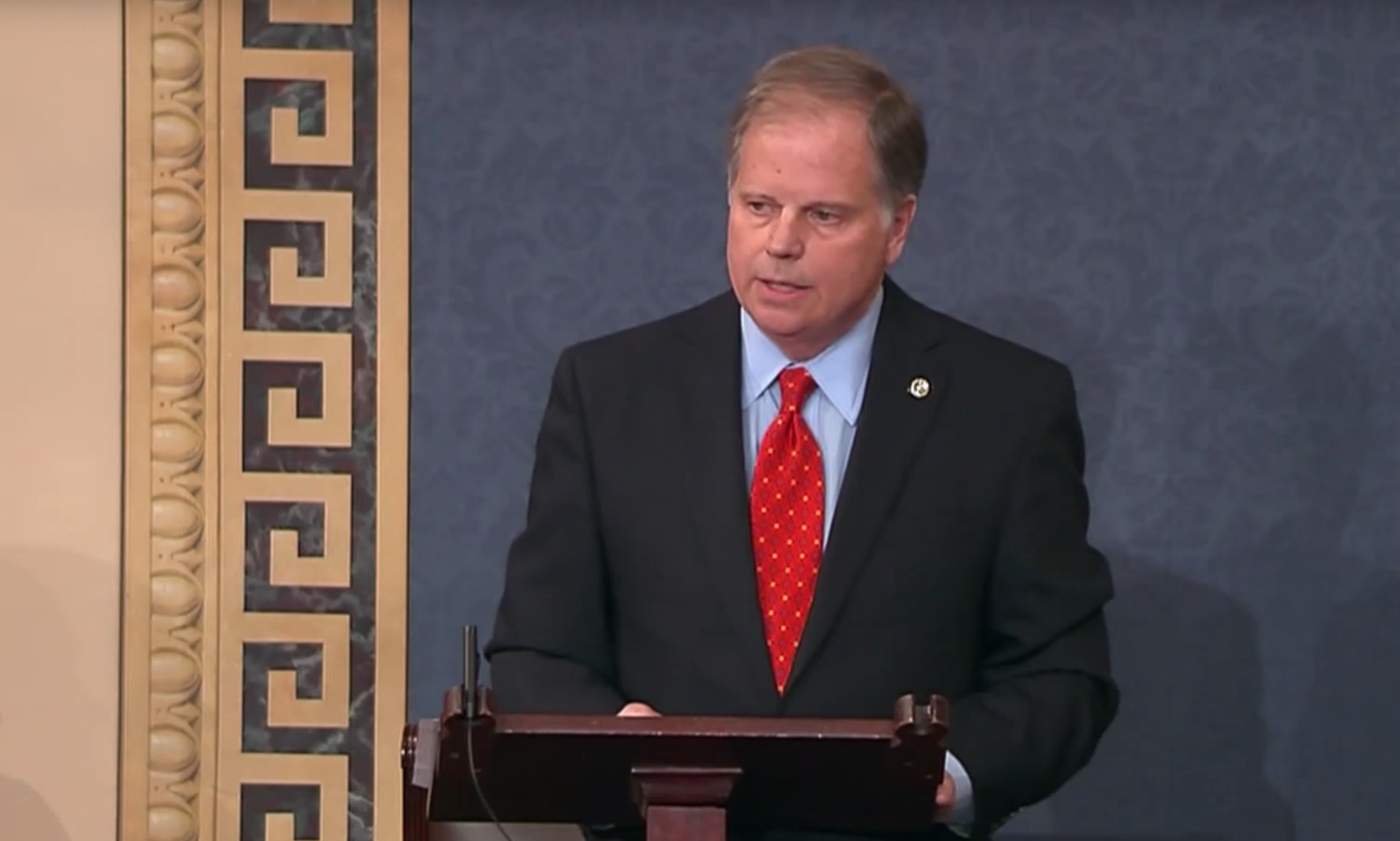Sen. Doug Jones, D-Alabama, on Thursday asked for unanimous consent on the floor of the U.S. Senate to pass legislation that would continue funding to minority-serving colleges and universities, but a Tennessee senator objected, putting a halt to its passage, at least for now.
The FUTURE Act would continue for two more years the $225 million annual payment to minority-serving colleges and universities. That funding, which advocates and those school administrators say is desperately needed to help serve minority students, is set to expire Sept. 30.
Sen. Jones and Sen. Tim Scott, R-S.C., introduced the bipartisan legislation, which was unanimously approved in the House and which pays for the $225 million by cutting subsidies to guaranty agencies that exist largely to collect student loan debts from the shuttered Federal Family Education Loan program.
Jones on Tuesday called for Senate Majority Leader Mitch McConnell to bring the act up for a vote in the Senate.
After Jones called for unanimous consent Thursday Sen. Lamar Alexander, R-Tenn., chair of the Senate Education Committee, objected, saying that he’d prefer a more long-term fix that included a reauthorization of the Higher Education Act.
Prior to the objection, Jones made his case for continuing the funding and said that Alabama is home to 14 historically black colleges and universities.
“More than any other state in the country. They are part of the fabric of our economy in Alabama, part of the fabric of our society and they are a pride of their communities…” Jones said. “They serve an incredibly important function. They educate those from underserved communities more than any college or university, and it is important that we continue to fund them because their challenges with funding are great.”
Historically black colleges and universities (HBCU) don’t have the sort of endowments that other universities rely on, Jones said, so they rely on Congress to provide the needed funding.
“Ensuring that historically black colleges and universities have continued funding is something we all want to do,” said Sen. Alexander after making his objection. “However, instead of a short term patch, I favor a long term solution.”
Alexander read a list of several changes he’d like to see approved and included in the reauthorization of the Higher Education Act, including a $255 million permanent mandatory funding for HBCUs, a streamlined FAFSA application and Pell grants for prisoners. He said he plans to bring those recommendations back up next week with Education Committee members.
“We have the time to do it, because while the language expires at the end of this month the money does it for several more months,” Alexander said.
Ben Miller, vice president of postsecondary education at the liberal think-tank the Center for American Progress, told APR before Jones spoke on the Senate floor Thursday that he’s heard from some in Washington who said the problem passing the legislation centers around cuts to those guaranty agencies, while others say they’d rather see a long-term solution than the two year fix provided through the act.
“Some people said they just don’t think these schools should get mandatory money.” Miller said. “So I don’t exactly know what the objection is.”
Miller also suspected that opposition to the act’s passage centers around Sen. Alexander’s desire reauthorize the Higher Education Act before Alexander retires in 2021.
“The time pressure here is real, and this fix from Senator Jones is bipartisan, bicameral, and it’s taken an administrative fee to a loan program that’s dead and dying, and giving it to the schools that we’ve historically underinvested in the most,” Miller said. “I can’t imagine a better trade than that.”
Opposition to the FUTURE Act has also come from those guaranty agencies and the trade groups that represent them, such as the National Council of Higher Education Resources (NCHER).
In a letter to the House Education Committee on June 18, James P. Bergen, president of NCHER, urged lawmakers to continue those subsidies.
If the revenue is eliminated through the FUTURE Act, Bergen wrote that “fewer families will receive important information that helps open the doors to college, fewer schools will receive basic administrative support, federal taxpayers will receive fewer protections, and guaranty agencies will be unable to perform critical functions that assist borrowers in avoiding default and protect federal taxpayers as the federal legacy program continues to wind‐down its operations.”
Miller described put the role of those guaranty agencies in a different light, however.
“They’re not servicing the loans. Private banks that issue the loans are servicing them. Their key function is debt collection,” Miller said, adding that many charge students exorbitant collection fees while paying large, mid-six figure salaries to their CEOs.
Speaking on the floor of the Senate after Sen Alexander’s objection Sen. Patty Murray, D-WA. expressed support of the FUTURE Act.
“What we’re seeing today really disappoints me. We have today a straightforward opportunity to prevent a critical part of our higher education system, [historically black colleges and universities] tribal colleges and other minority serving institutions from having to deal with a lapse in funding, and we should take it. This is bipartisan legislation, it has passed the House, there’s no reason at all to delay it a minute longer here in the Senate, so I want to thank Senator from Alabama for his leadership on this.”
Murray said that while she also wants to see a reauthorized Higher Education Act she believes it should encompass more than Alexander’s slimmed-down proposal.
“As I said before, I believe any reauthorization of the Higher Education Act needs to have real answers to the challenges students are facing today on affordability and access and accountability and campus safety,” Murray said.
In a message to APR on Thursday afternoon Sen. Jones office wrote that Sen Murray’s disappointment reflected his own.
“I’m glad that Senator Alexander, who I have great respect for and a great working relationship with, is open to doing something more long term on this as a part of a bigger package,’ Jones said. “But it’s still disappointing that this bipartisan bill, which passed unanimously in the House this week, can’t get done this month on its own merit. These schools just want to be able to focus on their mission and we need to give them the certainty they need to be able to do so.”





















































